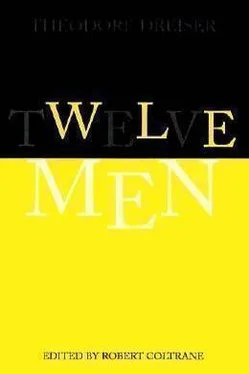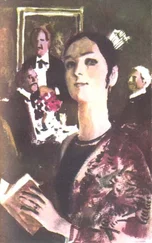Теодор Драйзер - Twelve Men
Здесь есть возможность читать онлайн «Теодор Драйзер - Twelve Men» весь текст электронной книги совершенно бесплатно (целиком полную версию без сокращений). В некоторых случаях можно слушать аудио, скачать через торрент в формате fb2 и присутствует краткое содержание. Год выпуска: 2014, Издательство: epubBooks Classics, Жанр: Биографии и Мемуары, на английском языке. Описание произведения, (предисловие) а так же отзывы посетителей доступны на портале библиотеки ЛибКат.
- Название:Twelve Men
- Автор:
- Издательство:epubBooks Classics
- Жанр:
- Год:2014
- ISBN:нет данных
- Рейтинг книги:4 / 5. Голосов: 1
-
Избранное:Добавить в избранное
- Отзывы:
-
Ваша оценка:
- 80
- 1
- 2
- 3
- 4
- 5
Twelve Men: краткое содержание, описание и аннотация
Предлагаем к чтению аннотацию, описание, краткое содержание или предисловие (зависит от того, что написал сам автор книги «Twelve Men»). Если вы не нашли необходимую информацию о книге — напишите в комментариях, мы постараемся отыскать её.
Twelve Men — читать онлайн бесплатно полную книгу (весь текст) целиком
Ниже представлен текст книги, разбитый по страницам. Система сохранения места последней прочитанной страницы, позволяет с удобством читать онлайн бесплатно книгу «Twelve Men», без необходимости каждый раз заново искать на чём Вы остановились. Поставьте закладку, и сможете в любой момент перейти на страницу, на которой закончили чтение.
Интервал:
Закладка:
But, as I say, at the time he seemed positively appalling to me, a virulent specimen, and I thought, "The Irish brute! To think of human beings having to work for a brute like that! To think of his driving men like that!" However, I soon began to discover that he was not so bad as he seemed, and then I began to like him.
The thing that brought about this swift change of feeling in me was the attitude of his men toward him. Although he was so insistent with his commands, they did not seem to mind nor to strain themselves working. They were not killing themselves, by any means. He would stand over them, crying, "Up with it! Up with it! Up with it! Up with it!" or "Down with it! Down with it! Down with it!" until you would have imagined their nerves would be worn to a frazzle. As it was, however, they did not seem to care any more than you would for the ticking of a clock; rather, they appeared to take it as a matter of course, something that had to be, and that one was prepared for. Their steps were in the main as leisurely as those of idlers on Fifth Avenue or Broadway. They carried boards or stone as one would objects of great value. One could not help smiling at the incongruity of it; it was farcical. Finally gathering the full import of it all, I ventured to laugh, and he turned on me with a sharp and yet not unkindly retort.
"Ha! ha! ha!" he mocked. "If ye had to work as hard as these min, ye wouldn't laugh."
I wanted to say, "Hard work, indeed!" but instead I replied, "Is that so? Well, I don't see that they're killing themselves, or you either. You're not as fierce as you sound."
Then I explained that I was not laughing at them but at him, and he took it all in good part. Since I was only a nominal laborer here, not a real one—permitted to work for my health, for twelve cents an hour—we fell to conversing upon railroad matters, and in this way our period of friendship began.
As I learned that morning, Rourke was the foreman–mason for minor tasks for all that part of the railroad that lay between New York and fifty miles out, on three divisions. He had a dozen or so men under him and was in possession of one car, which was shunted back and forth between the places in which he happened to be working. He was a builder of concrete platforms, culverts, coal–bins, sidewalks, bridge and building piers, and, in fact, anything that could be made out of crushed stone and cement, or bricks and stone, and he was sent here and there, as necessity required. As he explained to me at the time, he sometimes rose as early as four a.m. in order to get to his place of labor by seven. The great railroad company for which he toiled was no gentle master, and did not look upon his ease, or that of his men, as important. At the same time, as he himself confessed, he did not mind hard work—liked it, in short. He had been working now for the company for all of twenty–two years, "rain or shine." Darkness or storm made no difference to him. "Shewer, I have to be there," he observed once with his quizzical, elusive Irish grin. "They're not payin' me wages fer lyin' in bed. If ye was to get up that way yerself every day fer a year, me b'y," he added, eyeing my spare and none too well articulated frame, "it'd make a man av ye."
"Yes?" I said tolerantly. "And how much do you get, Rourke?"
"Two an' a half a day."
"You don't say!" I replied, pretending admiration.
The munificence of the corporation that paid him two and a half dollars a day for ten hours' work, as well as for superintending and constructing things of such importance, struck me forcibly. Perhaps, as we say in America, he "had a right" to be happy, only I could not see it. At the same time, I could not help thinking that he was better situated than myself at the time. I had been ill, and was now earning only twelve cents an hour for ten hours' work, and the sight of the foreman for whom I was working was a torture to my soul. He was such a loud–mouthed, blustering, red–headed ignoramus, and I wanted to get out from under him. At the same time, I was not without sufficient influence so to do, providing I could find a foreman who could make use of me. The great thing was to do this, and the more I eyed this particular specimen of foreman the better I liked him. He was genial, really kindly, amazingly simple and sincere. I decided to appeal to him to take me on his staff.
"How would you like to take me, Mr. Rourke, and let me work for you?" I asked hopefully, after explaining to him why I was here.
"Shewer," he replied. "Ye'd do fine."
"Would I have to work with the Italians?" I asked, wondering how I would make out with a pick and shovel. My frame was so spare at the time that the question must have amused him, considering the type of physique required for day labor.
"There'll be plenty av work fer ye to do without ever yer layin' a hand to a pick er shovel," he replied comfortingly. "Shewer, that's no work fer white min. Let the nagurs do it. Look at their backs an' arrms, an' then look at yers."
I was ready to blush for shame. These poor Italians whom I was so ready to contemn were immeasurably my physical superiors.
"But why do you call them negroes, Rourke?" I asked after a time. "They're not black."
"Well, bedad, they're not white, that's waan thing shewer," he added. "Aany man can tell that be lookin' at thim."
I had to smile. It was so dogmatic and unreasoning.
"Very well, then, they're black," I said, and we left the matter.
Not long after I put in a plea to be transferred to him, at his request, and it was granted. The day that I joined his flock, or gang, as he called it, he was at Williamsbridge, a little station north on the Harlem, building a concrete coal–bin. It was a pretty place, surrounded by trees and a grass–plot, a vast improvement upon a dark indoor shop, and seemed to me a veritable haven of rest. Ah, the smiling morning sun, the green leaves, the gentle fresh winds of heaven!
Rourke was down in an earthen excavation under the depot platform when I arrived, measuring and calculating with his plumb–bob and level, and when I looked in on him hopefully he looked up and smiled.
"So here ye arre at last," he said with a grin.
"Yes," I laughed.
"Well, ye're jist in time; I waant ye to go down to the ahffice."
"Certainly," I replied, but before I could say more he climbed out of his hole, his white jeans odorous of the new–turned earth, and fished in the pocket of an old gray coat which lay beside him for a soiled and crumpled letter, which he finally unfolded with his thick, clumsy fingers. Then he held it up and looked at it defiantly.
"I waant ye to go to Woodlawn," he continued, "an' look after some bolts that arre up there—there's a keg av thim—an' sign the bill fer thim, an' ship thim down to me. An' thin I waant ye to go down to the ahffice an' take thim this o.k." Here again he fished around and produced another crumpled slip, this time of a yellow color (how well I came to know them!), which I soon learned was an o.k. blank, a form which had to be filled in and signed for everything received, if no more than a stick of wood or a nail or a bolt. The company demanded these of all foremen, in order to keep its records straight. Its accounting department was useless without them. At the same time, Rourke kept talking of the "nonsinse av it," and the "onraisonableness" of demanding o.k.s for everything. "Ye'd think some one was goin' to sthale thim from thim," he declared irritably and defiantly.
I saw at once that some infraction of the railroad rules had occurred and that he had been "called down," or "jacked up" about it, as the railroad men expressed it. He was in a high state of dudgeon, and as defiant and pugnacious as his royal Irish temper would allow. At the same time he was pleased to think that I or some one had arrived who would relieve him of this damnable "nonsinse," or so he hoped. He was not so inexperienced as not to imagine that I could help him with all this. In fact, as time proved, this was my sole reason for being here.
Читать дальшеИнтервал:
Закладка:
Похожие книги на «Twelve Men»
Представляем Вашему вниманию похожие книги на «Twelve Men» списком для выбора. Мы отобрали схожую по названию и смыслу литературу в надежде предоставить читателям больше вариантов отыскать новые, интересные, ещё непрочитанные произведения.
Обсуждение, отзывы о книге «Twelve Men» и просто собственные мнения читателей. Оставьте ваши комментарии, напишите, что Вы думаете о произведении, его смысле или главных героях. Укажите что конкретно понравилось, а что нет, и почему Вы так считаете.









